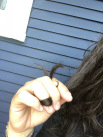As my children drift slowly into a deep, gentle sleep to the sound of the weeping willow trees swaying beside their window under the moonlight sky….oh who am I kidding. My kids fall asleep on microfiber polyester sheets under the screaming glare of the city street lights and honking horns listening to nursery rhymes read softly by people with British accents.
Interestingly both my kids have slight accents. Coincidence? Maybe….they also have cousins who are British so…maybe not.
Back on track. Nursery rhymes and how their “hidden messages” seep into the unconscious minds of developing babies and toddling toddlers and paints the original canvas of how the world views the roles of men and women for many children, at least in most Western countries.
“Sometimes the “good ol’ days” weren’t always so good. A cliche, I know…yet it needs to be said because much of what is taught to young children, specifically with regards to gender roles within society, keeps being taught to them without reflection or question. Nursery rhymes are a perfect example.
We become so “normalized” to what we hear/learn and this easily become our “truth.” It’s not until we are shown a different way to see or understand something that our core/base belief of a certain truth is challenged.
NURSERY RHYMES AND SEXIST LANGUAGE WHICH SUPPORT THE OPPRESSION OF WOMEN
Before we get into this I first need to say I am aware that every nursery rhyme has a story behind it’s origins. Knowing the origins to the rhyme can definitely change the meaning of the words. The problem lies in the fact that babies/young children aren’t able to appreciate the history in its relation to current culture norms. They take the words literally.
“By sexism in language I am referring to the use of words to express bias toward one sex over the other. Words that suggest women are inferior to men, words that suggest women are powerless; a mere object to be taken care of or discarded as the male (with power) pleases.
So how does something sooooo obvious, as the oppression of women around the world, continue for thousands and thousands of years? This period in history, 2019, is supposed to be the most civilized, most forward thinking people of all time and yet women are STILL fighting to be seen as and treated as equal HUMAN BEINGS….not objects.
One way it keeps happening is because both men and women are not making a conscious effort to change the narrative we teach our young children.
“Nursery rhymes perpetuate the encoding of the male worldview (with males at the top and in charge) into the fertile minds of babies and young children.
For example the idea that women are helpless and unable to cope with everyday life can be seen in the rhyme The Old Woman in a Shoe:
There was an old woman who lived in a shoe
She had so many children she did not know what to do;
She gave them some broth without any bread;
She whipped them all soundly and put them to bed.
Now that is one mad momma, eh? Most parents know that you want your children to go to bed on a full tummy so they can sleep longer. Also, most moms (and dads) don’t want to put their children to bed angry. The woman in this nursery rhyme is obviously at the end of her rope and we are hearing the story from the male point of view.
What if instead we heard the story from the female point of view?
“There was a young woman who lived in a shoe
Her man got her pregnant without an “I do”
He ditched her and left her without any hope;
So she tied a big knot at the end of her rope…..
And COPED!
What a different story that tells than the first version. Both versions could indeed be about the same person, right? Age is “relative” when it comes to parenting and back in the day of these nursery rhymes a woman could have been 28 and considered old.
Think about that one little change in the first line. An image of an old woman vs a young woman can be quite different. Let’s say she was indeed 28 years old. Maybe she did have 6 children with her man and he up and left; men (and women) do it all the time even when they are married.
Now this mother is suddenly and unexpectedly left with many mouths to feed and possibly for one, or two nights is unable to send her children to bed on full tummies or be emotionally available for them when they need her. Because she is coping and trying to figure out what to do moving forward.
Yet instead of focusing on the positive aspects of the mother/woman trying to cope without a support system or the baby’s daddy….the language in this nursery rhythm insinuates the female is “less than” and unable to cope with her “given” role….mother.
Wanna do another one? Ok, here we go:
Peter Peter Pumpkin eater,
Had a wife but couldn’t keep her;
He put her in a pumpkin shell
And there he kept her very well.
So, this dude “had a wife” which insinuates the woman is the object/owned by the man. He couldn’t “keep her” suggesting the wife maybe wanted a divorce? So instead of talking it out and respecting her, he locks her away in a pumpkin shell (think no windows and no doors) i.e. solitary confinement. After he locks her away he is able to keep her “very well”…my goodness, this is almost a guide on how to abduct and keep someone who wants to leave you.
Let’s do it from the female point of view:
“Peter Peter Pumpkin Eater
Lied about his “roaming” peter:
His wife found out, didn’t take it well.
She confidently packed her bags and said: “go to hell.”
This rhyme tells girls that they need to respect themselves enough to not wait around for someone who treats them like rubbish. It also tells little boys that lying and cheating could result in them being left by their wife.
One final rhyme. An all time favorite of mine which perpetuates the complacency of “silence” as acceptance among males in society when it comes to physically taking advantage of women:
Georgie Porgie, pudding and pie,
Kissed the girls and made them cry,
When the boys came out to play,
Georgie Porgie ran away.
(Deep long sigh). Ok, first it’s pretty obvious that Georgie appears to be a creepy dude who can’t converse with the ladies. He sees women as objects and he takes what he wants like a little boy stealing cookies from a cookie jar. The minute his peer group (the boys or authority figure) appear he races away because he knows what he did was wrong.
The problem is that the rhyme stops there. The language tells little boys it’s ok to kiss girls without asking and little girls learn that even when the “boys” (i.e. protection) arrive they won’t chase that jerk nor dry their tears.
The female version which empowers women AND men to act against abusers:
“Georgie Porgie the village perv
Tried to kiss the girls, he had some nerve
When the boys saw what went down,
They publicly shamed Georgie all over town.
I like the idea of other boys shaming each other when they see/hear them mistreating the females in their life. We all know that “locker room” talk happens and more than not it’s brushed off as “boys being boys.”
What if it wasn’t? What if the most alpha of the men in that locker room said “Hey, you’re talking about a person you know? Not a blowup doll or your truck. Use some respect, ok?” I can only imagine what would happen all over the world.
THE WRAP-UP
Sticks-and-stones-may-break-my-bones-but-words-will-never-hurt-me is such a lie. Words can hurt long after a bruise has healed or a scab falls off. The words and images we provide our children (especially the young ones) are constantly building their mental motherboard of what they will deem as “normal.”
The male dominated culture which we live in doesn’t have to be the culture our grandchildren live in if we become more aware of the language we use. I usually listen to music from the “good old days” (1940s), partially because I thought the lyrics would be better for little ears than most songs today.
We live near a street called Hollywood and each time we drove past it I would burst into singing the opening chorus of a song entitled “Hooray for Hollywood.” It wasn’t until I downloaded the song (per kids request to hear the rest of the song) and listened to the lyrics that I realized female objectification is everywhere. Here is my favorite verse (eye roll):
“Hooray for Hollywood
That screwy ballyhooey Hollywood
Where a young mechanic can be a panic
With just a good looking pan
And any shop girl can be a top girl
If she pleases the tired Businessman
It’s good to know that a girl doesn’t have to be talented, smart, clever, pretty, witty, strong or anything else really to get a part in the movie. She just has to be able to please her boss. Anyone ever heard of a guy name Harvey Weinstein? Hmmmm…..maybe he too listened to this song when he was a boy and took the advice to heart. One will never know.
““Language shapes the way we think, and determines what we can think about.”






